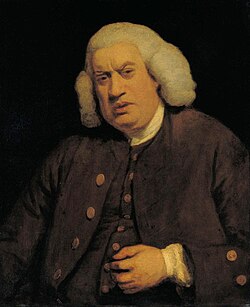Samuel Johnson Quote
Related Quotes
About Samuel Johnson
Samuel Johnson (18 September [O.S. 7 September] 1709 – 13 December 1784), often called Dr Johnson, was an English writer who made lasting contributions as a poet, playwright, essayist, moralist, literary critic, sermonist, biographer, editor, and lexicographer. The Oxford Dictionary of National Biography calls him "arguably the most distinguished man of letters in English history".
Born in Lichfield, Staffordshire, he attended Pembroke College, Oxford, until lack of funds forced him to leave. After working as a teacher, he moved to London and began writing for The Gentleman's Magazine. Early works include Life of Mr Richard Savage, the poems London and The Vanity of Human Wishes and the play Irene. After nine years of effort, Johnson's A Dictionary of the English Language appeared in 1755, and was acclaimed as "one of the greatest single achievements of scholarship". Later work included essays, an annotated The Plays of William Shakespeare, and the apologue The History of Rasselas, Prince of Abissinia. In 1763 he befriended James Boswell, with whom he travelled to Scotland, as Johnson described in A Journey to the Western Islands of Scotland. Near the end of his life came a massive, influential Lives of the Most Eminent English Poets of the 17th and 18th centuries.
Dr Johnson was a devout Anglican, and a committed Tory. Though tall and robust, he displayed gestures and tics that disconcerted some on meeting him. Boswell's Life of Samuel Johnson, along with other biographies, documented Johnson's behaviour and mannerisms in such detail that they have informed the posthumous diagnosis of Tourette syndrome, a condition not defined or diagnosed in the 18th century. After several illnesses, he died on the evening of 13 December 1784 and was buried in Westminster Abbey.
In his later life Johnson became a celebrity, and following his death he was increasingly seen to have had a lasting effect on literary criticism, even being claimed to be the one truly great critic of English literature. A prevailing mode of literary theory in the 20th century drew from his views, and he had a lasting impact on biography. Johnson's Dictionary had far-reaching effects on Modern English, and was pre-eminent until the arrival of the Oxford English Dictionary 150 years later. Boswell's Life was selected by Johnson biographer Walter Jackson Bate as "the most famous single work of biographical art in the whole of literature".
Born in Lichfield, Staffordshire, he attended Pembroke College, Oxford, until lack of funds forced him to leave. After working as a teacher, he moved to London and began writing for The Gentleman's Magazine. Early works include Life of Mr Richard Savage, the poems London and The Vanity of Human Wishes and the play Irene. After nine years of effort, Johnson's A Dictionary of the English Language appeared in 1755, and was acclaimed as "one of the greatest single achievements of scholarship". Later work included essays, an annotated The Plays of William Shakespeare, and the apologue The History of Rasselas, Prince of Abissinia. In 1763 he befriended James Boswell, with whom he travelled to Scotland, as Johnson described in A Journey to the Western Islands of Scotland. Near the end of his life came a massive, influential Lives of the Most Eminent English Poets of the 17th and 18th centuries.
Dr Johnson was a devout Anglican, and a committed Tory. Though tall and robust, he displayed gestures and tics that disconcerted some on meeting him. Boswell's Life of Samuel Johnson, along with other biographies, documented Johnson's behaviour and mannerisms in such detail that they have informed the posthumous diagnosis of Tourette syndrome, a condition not defined or diagnosed in the 18th century. After several illnesses, he died on the evening of 13 December 1784 and was buried in Westminster Abbey.
In his later life Johnson became a celebrity, and following his death he was increasingly seen to have had a lasting effect on literary criticism, even being claimed to be the one truly great critic of English literature. A prevailing mode of literary theory in the 20th century drew from his views, and he had a lasting impact on biography. Johnson's Dictionary had far-reaching effects on Modern English, and was pre-eminent until the arrival of the Oxford English Dictionary 150 years later. Boswell's Life was selected by Johnson biographer Walter Jackson Bate as "the most famous single work of biographical art in the whole of literature".
